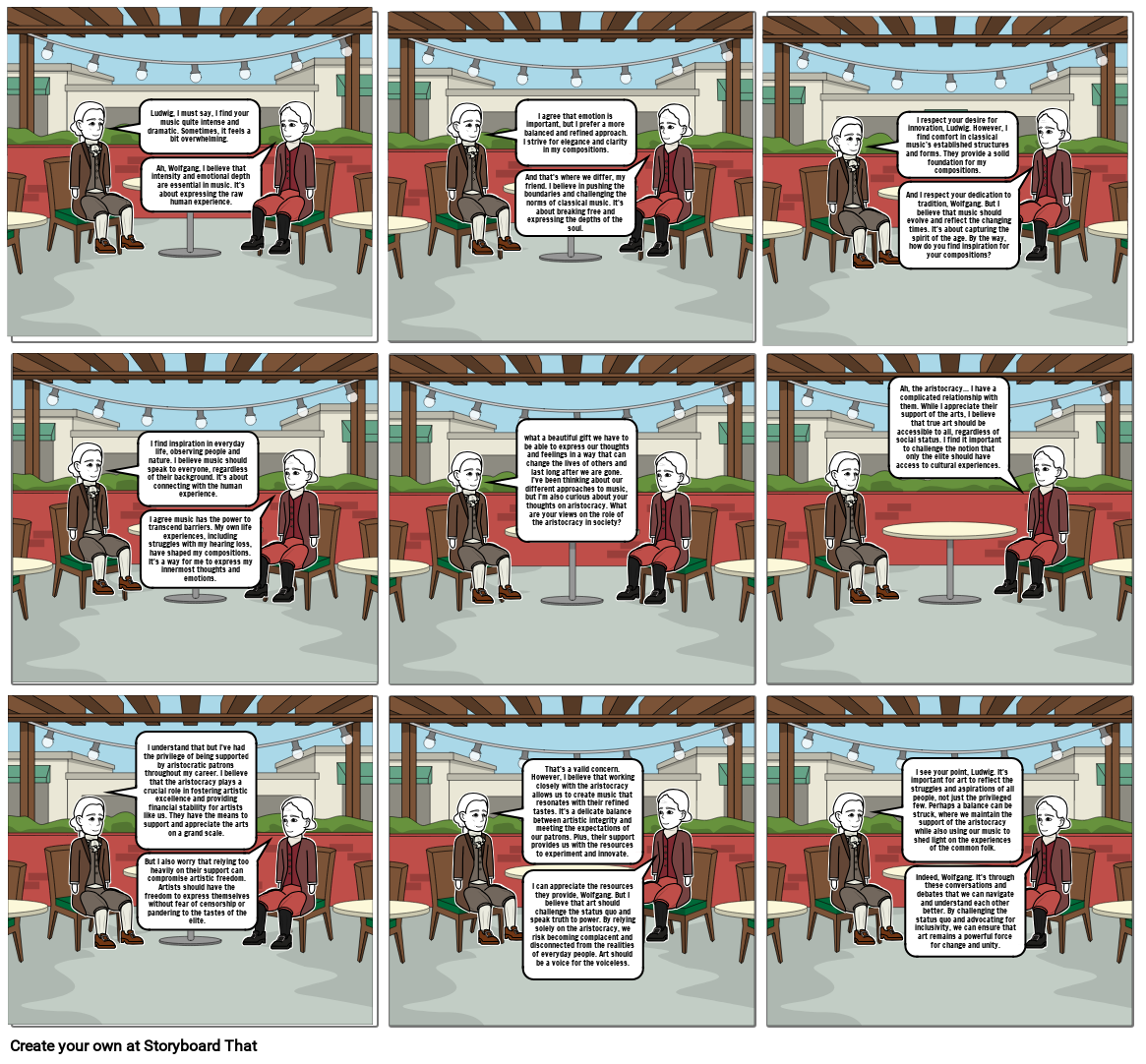A conversation between Mozart and Beethoven

Tekst Storyboardowy
- Ludwig, I must say, I find your music quite intense and dramatic. Sometimes, it feels a bit overwhelming.
- Ah, Wolfgang, I believe that intensity and emotional depth are essential in music. It's about expressing the raw human experience.
- I agree that emotion is important, but I prefer a more balanced and refined approach. I strive for elegance and clarity in my compositions.
- And that's where we differ, my friend. I believe in pushing the boundaries and challenging the norms of classical music. It's about breaking free and expressing the depths of the soul.
- I respect your desire for innovation, Ludwig. However, I find comfort in classical music’s established structures and forms. They provide a solid foundation for my compositions.
- And I respect your dedication to tradition, Wolfgang. But I believe that music should evolve and reflect the changing times. It's about capturing the spirit of the age. By the way, how do you find inspiration for your compositions?
- I find inspiration in everyday life, observing people and nature. I believe music should speak to everyone, regardless of their background. It's about connecting with the human experience.
- I agree music has the power to transcend barriers. My own life experiences, including struggles with my hearing loss, have shaped my compositions. It's a way for me to express my innermost thoughts and emotions.
- what a beautiful gift we have to be able to express our thoughts and feelings in a way that can change the lives of others and last long after we are gone. I've been thinking about our different approaches to music, but I'm also curious about your thoughts on aristocracy. What are your views on the role of the aristocracy in society?
- Ah, the aristocracy... I have a complicated relationship with them. While I appreciate their support of the arts, I believe that true art should be accessible to all, regardless of social status. I find it important to challenge the notion that only the elite should have access to cultural experiences.
- I understand that but I've had the privilege of being supported by aristocratic patrons throughout my career. I believe that the aristocracy plays a crucial role in fostering artistic excellence and providing financial stability for artists like us. They have the means to support and appreciate the arts on a grand scale.
- But I also worry that relying too heavily on their support can compromise artistic freedom. Artists should have the freedom to express themselves without fear of censorship or pandering to the tastes of the elite.
- That's a valid concern. However, I believe that working closely with the aristocracy allows us to create music that resonates with their refined tastes. It's a delicate balance between artistic integrity and meeting the expectations of our patrons. Plus, their support provides us with the resources to experiment and innovate.
- I can appreciate the resources they provide, Wolfgang. But I believe that art should challenge the status quo and speak truth to power. By relying solely on the aristocracy, we risk becoming complacent and disconnected from the realities of everyday people. Art should be a voice for the voiceless.
- I see your point, Ludwig. It's important for art to reflect the struggles and aspirations of all people, not just the privileged few. Perhaps a balance can be struck, where we maintain the support of the aristocracy while also using our music to shed light on the experiences of the common folk.
- Indeed, Wolfgang. It's through these conversations and debates that we can navigate and understand each other better. By challenging the status quo and advocating for inclusivity, we can ensure that art remains a powerful force for change and unity.
Utworzono ponad 30 milionów scenorysów

